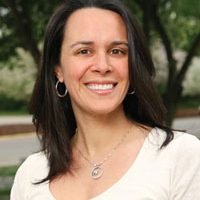by Jennifer Philion

First-year student and women's basketball forward Alicia Doucet (left) teachers the finer - and funnier - points of basketball to local schoolgirls.
It’s an incredible balancing act, the life of a student-athlete. Even the term “student-athlete” implies as much.
Study groups and practices. Classes and competitions. Homework and workouts. And at Plymouth State University, student-athletes incorporate even more into the balance: community service.
Director of Athletics John Clark points to the PSU athletics department mission, which states that as a member of the NCAA Division III, the University seeks to “establish and maintain an environment in which a student-athlete’s athletics activities are conducted as an integral part of the student-athlete’s educational experience.”
“We consider service an important part of a well-rounded education,” Clark says. “It’s in the school motto, Ut prosim (That I may serve). We ask every coach and team to embrace that philosophy.”
So throughout each academic year, teams take on service projects in the community: participating in the local Walk to Fight Cancer, where the PSU women’s hockey team was one of the top fundraising groups in 2008; volunteering at the Pemi Youth Center; and pitching in (in the case of the baseball team) to help local organizations fight hunger and homelessness.
“Being an athlete is more than going out on the field,” says softball player Jenna George, early childhood education major. “Being involved in community service shows our respect for the community and lets us represent PSU in a different way.”
George doesn’t only take part in the softball team’s service activities. As president of the PSU Student-Athlete Advisory Council (SAAC), she organizes service projects for that group as well. The SAAC, made up of representatives from PSU’s athletic teams, works to enhance the total student-athlete experience at the University. Leaders of the PSU council meet with SAAC representatives from the other Little East Conference schools to discuss issues facing student-athletes.
George and previous SAAC leaders have seen the value of having the council organize and participate in its own service activities. “We want to show people that we’re about more than just athletics,” she says. “Over the past year, we’ve been focused on creating partnerships within the community and with other University groups that allow us to do good work for others.”
Sophomore Doug Clark is the SAAC treasurer and a member of the PSU ski team. For him, community service has become a way of life. “I’ve been [volunteering] since ninth grade,” he says. “I enjoy putting a smile on people’s faces, and I believe that what goes around, comes around.”
Both student-athletes come from outside New Hampshire—George is from Rhode Island, and Clark is from southern New York—and say that being involved with service projects has helped them feel more at home at PSU and in the communities it serves. “It’s good to have those connections,” says George.
They’re also gaining valuable experience. “Service gives you a good work ethic and helps you interact better with people,” Clark says. “I’m a better public speaker now, and I’m learning professionalism and organizational skills.”
Clark and George were involved in a SAAC partnership with the New Hampshire Electric Co-op Foundation last fall, organizing a fundraiser at PSU Athletics’ 2008 opening weekend as part of NHEC’s “Food Bank Challenge.” The event raised $650, matched by the foundation for a total food bank donation of $1300.
Foundation Executive Director Judy Gove was glad to have the chance to work with the student-athletes of SAAC. “Jenna and Doug were very positive and demonstrated their understanding in what the fundraising was all about,” she says. “We are very grateful to everyone who participated and would be happy to work with the SAAC in the future.”
An upcoming project for SAAC will involve raising money for the Children’s Hospital at Dartmouth. “It’s farther away, but an important organization in the state,” Doug Clark says. “And if PSU can reach out that far to help, that’s a good thing.”
He adds that with school, sports, and service activities, he’s “always busy,” but it’s worth it. George agrees. “I do take on a lot,” she says. “But at the end of the day, I know I’ve helped somebody and I feel great. This is just the start of what I want to do.”








